Exploring the Concept: Is Death a Harm? A Philosophical Essay
VerifiedAdded on 2021/02/19
|7
|2070
|49
Essay
AI Summary
This essay delves into the philosophical question of whether death constitutes a harm, exploring diverse perspectives and ethical considerations. It begins by defining death and outlining various viewpoints, including Epicurus's view that death is not an experience and Lucretius's argument that a person cannot be harmed after death. The essay then examines Nagel's contrasting perspective, which suggests death can be a harm regardless of a person's ability to experience it. Furthermore, the essay discusses the implications of abortion, highlighting the moral complexities and ethical dilemmas surrounding the termination of pregnancy. It references arguments about personhood and the permissibility of abortion, concluding that, except in certain circumstances, abortion is wrong. The essay concludes that death can harm a person even after their physical existence, considering philosophical harm like ceasing of all elements of existence, and the potential harm to their descendants. The essay also touches upon the impact of abortion and how it can cause harm, and ultimately the conclusion is that death can be a harm.
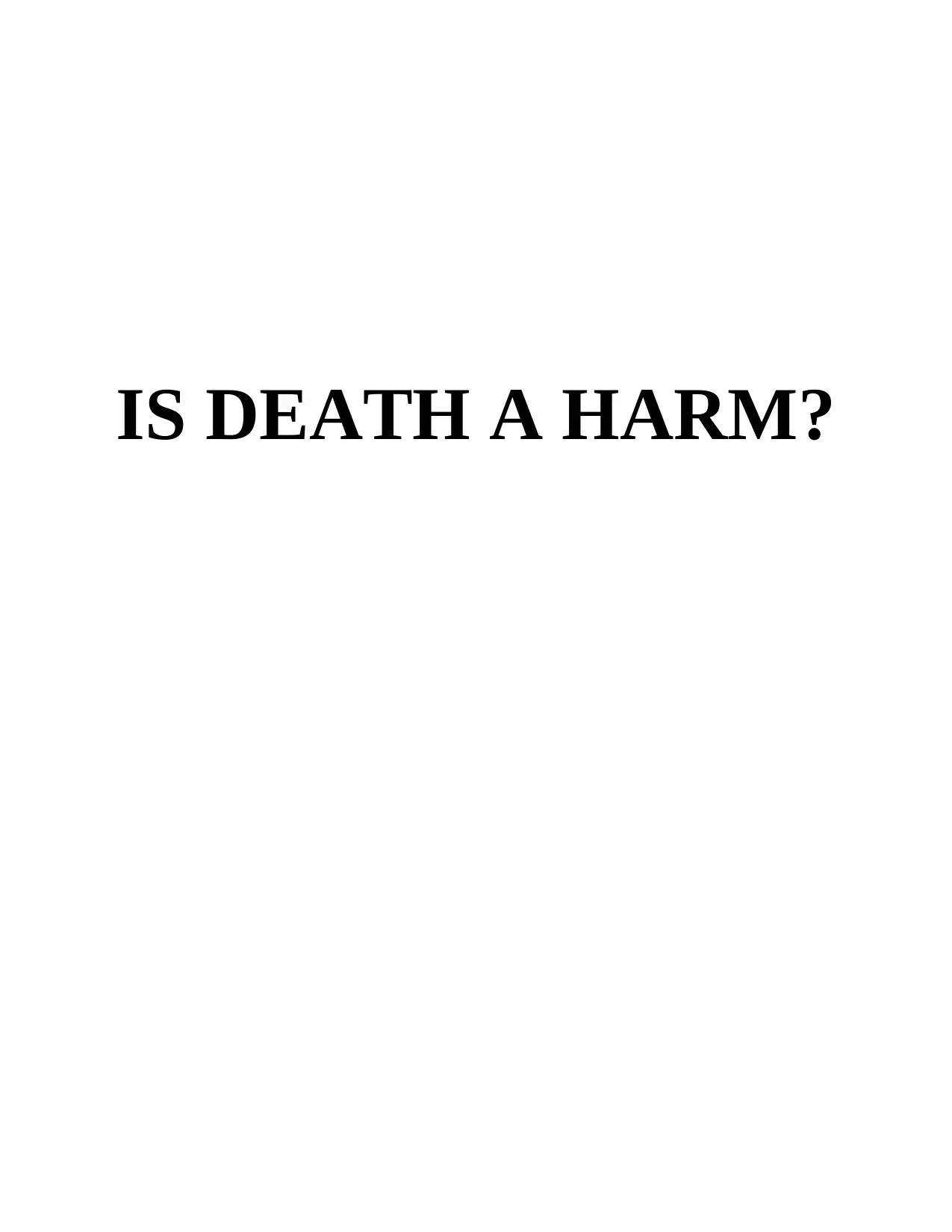
IS DEATH A HARM?
Paraphrase This Document
Need a fresh take? Get an instant paraphrase of this document with our AI Paraphraser

Table of Contents
INTRODUCTION...........................................................................................................................1
MAIN BODY...................................................................................................................................1
CONCLUSION................................................................................................................................4
REFERENCES................................................................................................................................5
INTRODUCTION...........................................................................................................................1
MAIN BODY...................................................................................................................................1
CONCLUSION................................................................................................................................4
REFERENCES................................................................................................................................5
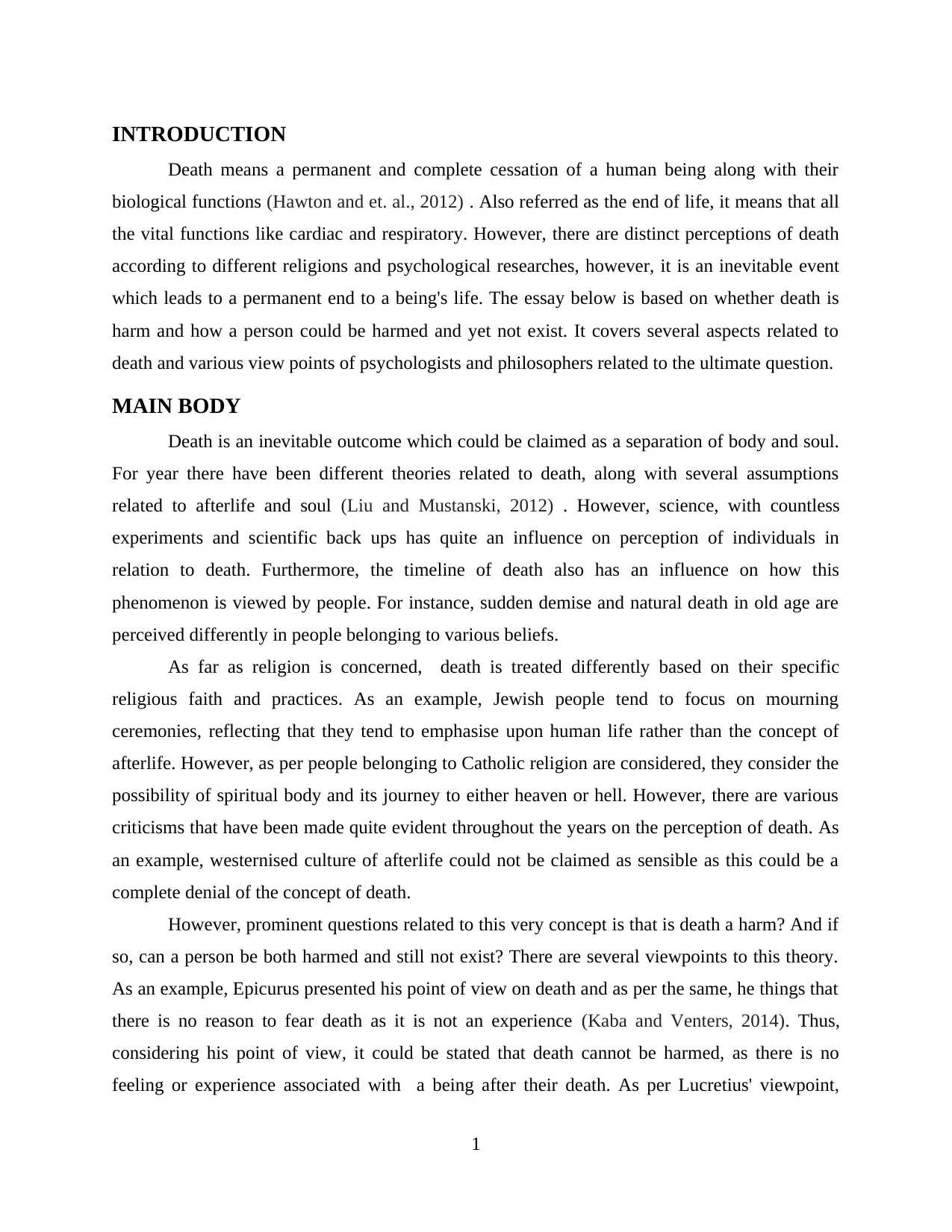
INTRODUCTION
Death means a permanent and complete cessation of a human being along with their
biological functions (Hawton and et. al., 2012) . Also referred as the end of life, it means that all
the vital functions like cardiac and respiratory. However, there are distinct perceptions of death
according to different religions and psychological researches, however, it is an inevitable event
which leads to a permanent end to a being's life. The essay below is based on whether death is
harm and how a person could be harmed and yet not exist. It covers several aspects related to
death and various view points of psychologists and philosophers related to the ultimate question.
MAIN BODY
Death is an inevitable outcome which could be claimed as a separation of body and soul.
For year there have been different theories related to death, along with several assumptions
related to afterlife and soul (Liu and Mustanski, 2012) . However, science, with countless
experiments and scientific back ups has quite an influence on perception of individuals in
relation to death. Furthermore, the timeline of death also has an influence on how this
phenomenon is viewed by people. For instance, sudden demise and natural death in old age are
perceived differently in people belonging to various beliefs.
As far as religion is concerned, death is treated differently based on their specific
religious faith and practices. As an example, Jewish people tend to focus on mourning
ceremonies, reflecting that they tend to emphasise upon human life rather than the concept of
afterlife. However, as per people belonging to Catholic religion are considered, they consider the
possibility of spiritual body and its journey to either heaven or hell. However, there are various
criticisms that have been made quite evident throughout the years on the perception of death. As
an example, westernised culture of afterlife could not be claimed as sensible as this could be a
complete denial of the concept of death.
However, prominent questions related to this very concept is that is death a harm? And if
so, can a person be both harmed and still not exist? There are several viewpoints to this theory.
As an example, Epicurus presented his point of view on death and as per the same, he things that
there is no reason to fear death as it is not an experience (Kaba and Venters, 2014). Thus,
considering his point of view, it could be stated that death cannot be harmed, as there is no
feeling or experience associated with a being after their death. As per Lucretius' viewpoint,
1
Death means a permanent and complete cessation of a human being along with their
biological functions (Hawton and et. al., 2012) . Also referred as the end of life, it means that all
the vital functions like cardiac and respiratory. However, there are distinct perceptions of death
according to different religions and psychological researches, however, it is an inevitable event
which leads to a permanent end to a being's life. The essay below is based on whether death is
harm and how a person could be harmed and yet not exist. It covers several aspects related to
death and various view points of psychologists and philosophers related to the ultimate question.
MAIN BODY
Death is an inevitable outcome which could be claimed as a separation of body and soul.
For year there have been different theories related to death, along with several assumptions
related to afterlife and soul (Liu and Mustanski, 2012) . However, science, with countless
experiments and scientific back ups has quite an influence on perception of individuals in
relation to death. Furthermore, the timeline of death also has an influence on how this
phenomenon is viewed by people. For instance, sudden demise and natural death in old age are
perceived differently in people belonging to various beliefs.
As far as religion is concerned, death is treated differently based on their specific
religious faith and practices. As an example, Jewish people tend to focus on mourning
ceremonies, reflecting that they tend to emphasise upon human life rather than the concept of
afterlife. However, as per people belonging to Catholic religion are considered, they consider the
possibility of spiritual body and its journey to either heaven or hell. However, there are various
criticisms that have been made quite evident throughout the years on the perception of death. As
an example, westernised culture of afterlife could not be claimed as sensible as this could be a
complete denial of the concept of death.
However, prominent questions related to this very concept is that is death a harm? And if
so, can a person be both harmed and still not exist? There are several viewpoints to this theory.
As an example, Epicurus presented his point of view on death and as per the same, he things that
there is no reason to fear death as it is not an experience (Kaba and Venters, 2014). Thus,
considering his point of view, it could be stated that death cannot be harmed, as there is no
feeling or experience associated with a being after their death. As per Lucretius' viewpoint,
1
⊘ This is a preview!⊘
Do you want full access?
Subscribe today to unlock all pages.

Trusted by 1+ million students worldwide
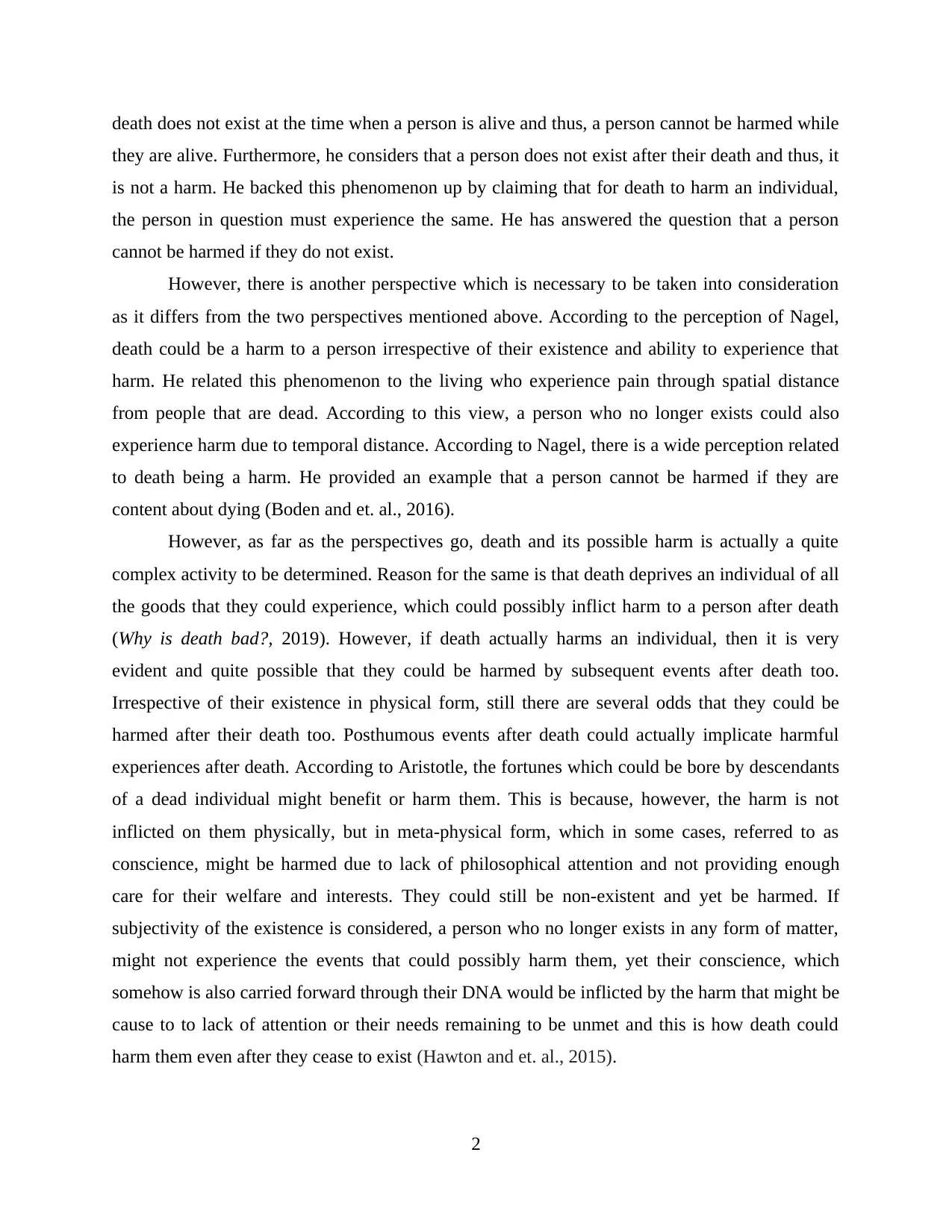
death does not exist at the time when a person is alive and thus, a person cannot be harmed while
they are alive. Furthermore, he considers that a person does not exist after their death and thus, it
is not a harm. He backed this phenomenon up by claiming that for death to harm an individual,
the person in question must experience the same. He has answered the question that a person
cannot be harmed if they do not exist.
However, there is another perspective which is necessary to be taken into consideration
as it differs from the two perspectives mentioned above. According to the perception of Nagel,
death could be a harm to a person irrespective of their existence and ability to experience that
harm. He related this phenomenon to the living who experience pain through spatial distance
from people that are dead. According to this view, a person who no longer exists could also
experience harm due to temporal distance. According to Nagel, there is a wide perception related
to death being a harm. He provided an example that a person cannot be harmed if they are
content about dying (Boden and et. al., 2016).
However, as far as the perspectives go, death and its possible harm is actually a quite
complex activity to be determined. Reason for the same is that death deprives an individual of all
the goods that they could experience, which could possibly inflict harm to a person after death
(Why is death bad?, 2019). However, if death actually harms an individual, then it is very
evident and quite possible that they could be harmed by subsequent events after death too.
Irrespective of their existence in physical form, still there are several odds that they could be
harmed after their death too. Posthumous events after death could actually implicate harmful
experiences after death. According to Aristotle, the fortunes which could be bore by descendants
of a dead individual might benefit or harm them. This is because, however, the harm is not
inflicted on them physically, but in meta-physical form, which in some cases, referred to as
conscience, might be harmed due to lack of philosophical attention and not providing enough
care for their welfare and interests. They could still be non-existent and yet be harmed. If
subjectivity of the existence is considered, a person who no longer exists in any form of matter,
might not experience the events that could possibly harm them, yet their conscience, which
somehow is also carried forward through their DNA would be inflicted by the harm that might be
cause to to lack of attention or their needs remaining to be unmet and this is how death could
harm them even after they cease to exist (Hawton and et. al., 2015).
2
they are alive. Furthermore, he considers that a person does not exist after their death and thus, it
is not a harm. He backed this phenomenon up by claiming that for death to harm an individual,
the person in question must experience the same. He has answered the question that a person
cannot be harmed if they do not exist.
However, there is another perspective which is necessary to be taken into consideration
as it differs from the two perspectives mentioned above. According to the perception of Nagel,
death could be a harm to a person irrespective of their existence and ability to experience that
harm. He related this phenomenon to the living who experience pain through spatial distance
from people that are dead. According to this view, a person who no longer exists could also
experience harm due to temporal distance. According to Nagel, there is a wide perception related
to death being a harm. He provided an example that a person cannot be harmed if they are
content about dying (Boden and et. al., 2016).
However, as far as the perspectives go, death and its possible harm is actually a quite
complex activity to be determined. Reason for the same is that death deprives an individual of all
the goods that they could experience, which could possibly inflict harm to a person after death
(Why is death bad?, 2019). However, if death actually harms an individual, then it is very
evident and quite possible that they could be harmed by subsequent events after death too.
Irrespective of their existence in physical form, still there are several odds that they could be
harmed after their death too. Posthumous events after death could actually implicate harmful
experiences after death. According to Aristotle, the fortunes which could be bore by descendants
of a dead individual might benefit or harm them. This is because, however, the harm is not
inflicted on them physically, but in meta-physical form, which in some cases, referred to as
conscience, might be harmed due to lack of philosophical attention and not providing enough
care for their welfare and interests. They could still be non-existent and yet be harmed. If
subjectivity of the existence is considered, a person who no longer exists in any form of matter,
might not experience the events that could possibly harm them, yet their conscience, which
somehow is also carried forward through their DNA would be inflicted by the harm that might be
cause to to lack of attention or their needs remaining to be unmet and this is how death could
harm them even after they cease to exist (Hawton and et. al., 2015).
2
Paraphrase This Document
Need a fresh take? Get an instant paraphrase of this document with our AI Paraphraser
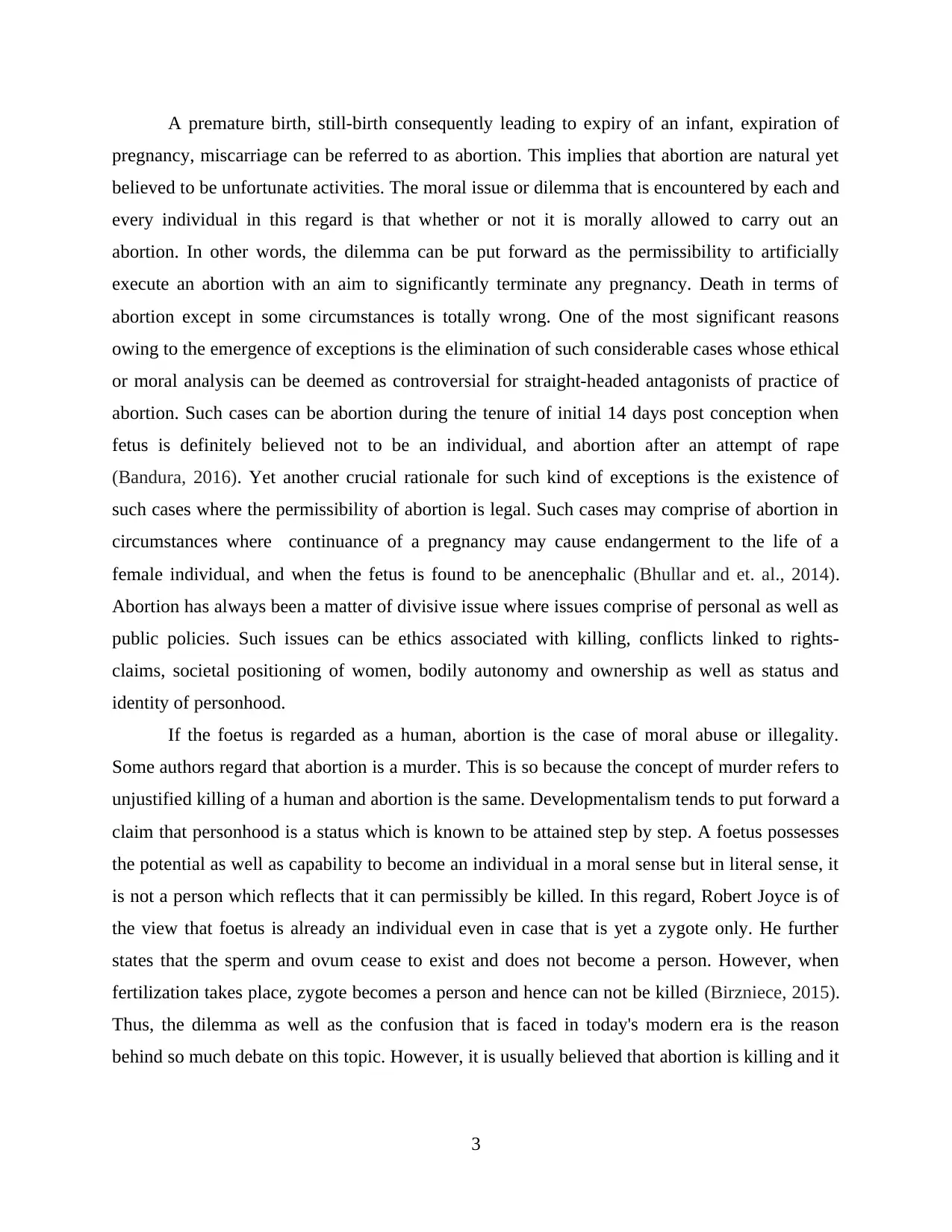
A premature birth, still-birth consequently leading to expiry of an infant, expiration of
pregnancy, miscarriage can be referred to as abortion. This implies that abortion are natural yet
believed to be unfortunate activities. The moral issue or dilemma that is encountered by each and
every individual in this regard is that whether or not it is morally allowed to carry out an
abortion. In other words, the dilemma can be put forward as the permissibility to artificially
execute an abortion with an aim to significantly terminate any pregnancy. Death in terms of
abortion except in some circumstances is totally wrong. One of the most significant reasons
owing to the emergence of exceptions is the elimination of such considerable cases whose ethical
or moral analysis can be deemed as controversial for straight-headed antagonists of practice of
abortion. Such cases can be abortion during the tenure of initial 14 days post conception when
fetus is definitely believed not to be an individual, and abortion after an attempt of rape
(Bandura, 2016). Yet another crucial rationale for such kind of exceptions is the existence of
such cases where the permissibility of abortion is legal. Such cases may comprise of abortion in
circumstances where continuance of a pregnancy may cause endangerment to the life of a
female individual, and when the fetus is found to be anencephalic (Bhullar and et. al., 2014).
Abortion has always been a matter of divisive issue where issues comprise of personal as well as
public policies. Such issues can be ethics associated with killing, conflicts linked to rights-
claims, societal positioning of women, bodily autonomy and ownership as well as status and
identity of personhood.
If the foetus is regarded as a human, abortion is the case of moral abuse or illegality.
Some authors regard that abortion is a murder. This is so because the concept of murder refers to
unjustified killing of a human and abortion is the same. Developmentalism tends to put forward a
claim that personhood is a status which is known to be attained step by step. A foetus possesses
the potential as well as capability to become an individual in a moral sense but in literal sense, it
is not a person which reflects that it can permissibly be killed. In this regard, Robert Joyce is of
the view that foetus is already an individual even in case that is yet a zygote only. He further
states that the sperm and ovum cease to exist and does not become a person. However, when
fertilization takes place, zygote becomes a person and hence can not be killed (Birzniece, 2015).
Thus, the dilemma as well as the confusion that is faced in today's modern era is the reason
behind so much debate on this topic. However, it is usually believed that abortion is killing and it
3
pregnancy, miscarriage can be referred to as abortion. This implies that abortion are natural yet
believed to be unfortunate activities. The moral issue or dilemma that is encountered by each and
every individual in this regard is that whether or not it is morally allowed to carry out an
abortion. In other words, the dilemma can be put forward as the permissibility to artificially
execute an abortion with an aim to significantly terminate any pregnancy. Death in terms of
abortion except in some circumstances is totally wrong. One of the most significant reasons
owing to the emergence of exceptions is the elimination of such considerable cases whose ethical
or moral analysis can be deemed as controversial for straight-headed antagonists of practice of
abortion. Such cases can be abortion during the tenure of initial 14 days post conception when
fetus is definitely believed not to be an individual, and abortion after an attempt of rape
(Bandura, 2016). Yet another crucial rationale for such kind of exceptions is the existence of
such cases where the permissibility of abortion is legal. Such cases may comprise of abortion in
circumstances where continuance of a pregnancy may cause endangerment to the life of a
female individual, and when the fetus is found to be anencephalic (Bhullar and et. al., 2014).
Abortion has always been a matter of divisive issue where issues comprise of personal as well as
public policies. Such issues can be ethics associated with killing, conflicts linked to rights-
claims, societal positioning of women, bodily autonomy and ownership as well as status and
identity of personhood.
If the foetus is regarded as a human, abortion is the case of moral abuse or illegality.
Some authors regard that abortion is a murder. This is so because the concept of murder refers to
unjustified killing of a human and abortion is the same. Developmentalism tends to put forward a
claim that personhood is a status which is known to be attained step by step. A foetus possesses
the potential as well as capability to become an individual in a moral sense but in literal sense, it
is not a person which reflects that it can permissibly be killed. In this regard, Robert Joyce is of
the view that foetus is already an individual even in case that is yet a zygote only. He further
states that the sperm and ovum cease to exist and does not become a person. However, when
fertilization takes place, zygote becomes a person and hence can not be killed (Birzniece, 2015).
Thus, the dilemma as well as the confusion that is faced in today's modern era is the reason
behind so much debate on this topic. However, it is usually believed that abortion is killing and it
3
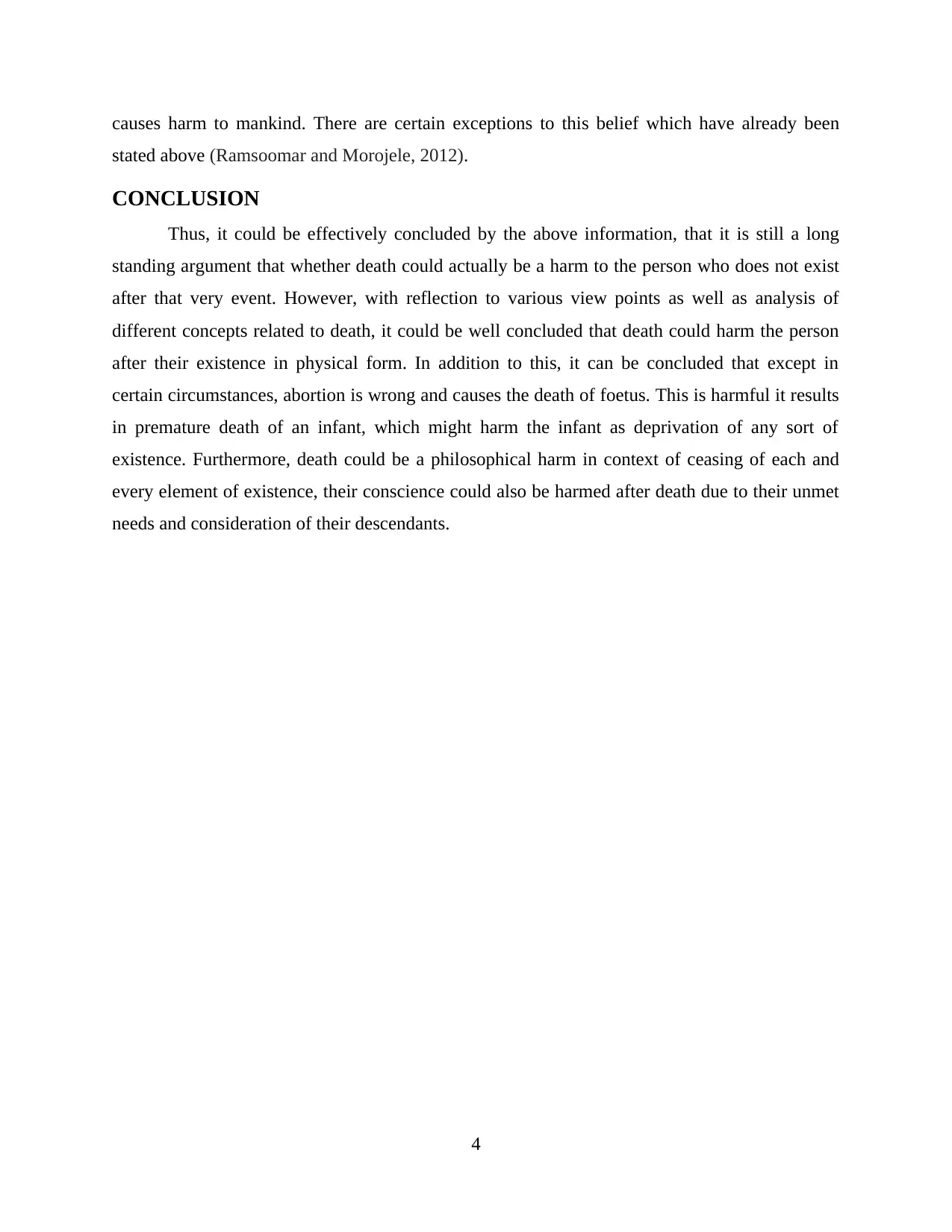
causes harm to mankind. There are certain exceptions to this belief which have already been
stated above (Ramsoomar and Morojele, 2012).
CONCLUSION
Thus, it could be effectively concluded by the above information, that it is still a long
standing argument that whether death could actually be a harm to the person who does not exist
after that very event. However, with reflection to various view points as well as analysis of
different concepts related to death, it could be well concluded that death could harm the person
after their existence in physical form. In addition to this, it can be concluded that except in
certain circumstances, abortion is wrong and causes the death of foetus. This is harmful it results
in premature death of an infant, which might harm the infant as deprivation of any sort of
existence. Furthermore, death could be a philosophical harm in context of ceasing of each and
every element of existence, their conscience could also be harmed after death due to their unmet
needs and consideration of their descendants.
4
stated above (Ramsoomar and Morojele, 2012).
CONCLUSION
Thus, it could be effectively concluded by the above information, that it is still a long
standing argument that whether death could actually be a harm to the person who does not exist
after that very event. However, with reflection to various view points as well as analysis of
different concepts related to death, it could be well concluded that death could harm the person
after their existence in physical form. In addition to this, it can be concluded that except in
certain circumstances, abortion is wrong and causes the death of foetus. This is harmful it results
in premature death of an infant, which might harm the infant as deprivation of any sort of
existence. Furthermore, death could be a philosophical harm in context of ceasing of each and
every element of existence, their conscience could also be harmed after death due to their unmet
needs and consideration of their descendants.
4
⊘ This is a preview!⊘
Do you want full access?
Subscribe today to unlock all pages.

Trusted by 1+ million students worldwide
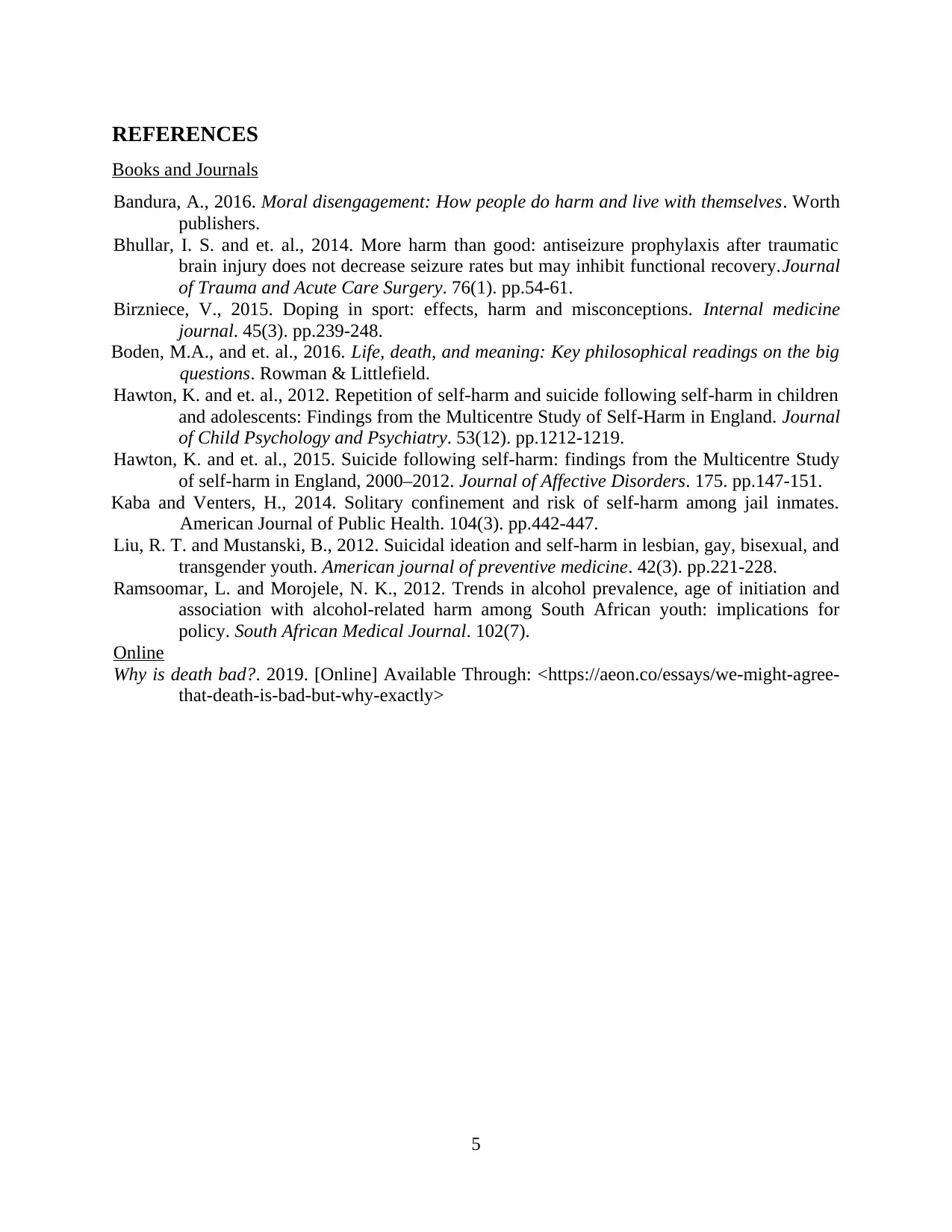
REFERENCES
Books and Journals
Bandura, A., 2016. Moral disengagement: How people do harm and live with themselves. Worth
publishers.
Bhullar, I. S. and et. al., 2014. More harm than good: antiseizure prophylaxis after traumatic
brain injury does not decrease seizure rates but may inhibit functional recovery.Journal
of Trauma and Acute Care Surgery. 76(1). pp.54-61.
Birzniece, V., 2015. Doping in sport: effects, harm and misconceptions. Internal medicine
journal. 45(3). pp.239-248.
Boden, M.A., and et. al., 2016. Life, death, and meaning: Key philosophical readings on the big
questions. Rowman & Littlefield.
Hawton, K. and et. al., 2012. Repetition of self‐harm and suicide following self‐harm in children
and adolescents: Findings from the Multicentre Study of Self‐Harm in England. Journal
of Child Psychology and Psychiatry. 53(12). pp.1212-1219.
Hawton, K. and et. al., 2015. Suicide following self-harm: findings from the Multicentre Study
of self-harm in England, 2000–2012. Journal of Affective Disorders. 175. pp.147-151.
Kaba and Venters, H., 2014. Solitary confinement and risk of self-harm among jail inmates.
American Journal of Public Health. 104(3). pp.442-447.
Liu, R. T. and Mustanski, B., 2012. Suicidal ideation and self-harm in lesbian, gay, bisexual, and
transgender youth. American journal of preventive medicine. 42(3). pp.221-228.
Ramsoomar, L. and Morojele, N. K., 2012. Trends in alcohol prevalence, age of initiation and
association with alcohol-related harm among South African youth: implications for
policy. South African Medical Journal. 102(7).
Online
Why is death bad?. 2019. [Online] Available Through: <https://aeon.co/essays/we-might-agree-
that-death-is-bad-but-why-exactly>
5
Books and Journals
Bandura, A., 2016. Moral disengagement: How people do harm and live with themselves. Worth
publishers.
Bhullar, I. S. and et. al., 2014. More harm than good: antiseizure prophylaxis after traumatic
brain injury does not decrease seizure rates but may inhibit functional recovery.Journal
of Trauma and Acute Care Surgery. 76(1). pp.54-61.
Birzniece, V., 2015. Doping in sport: effects, harm and misconceptions. Internal medicine
journal. 45(3). pp.239-248.
Boden, M.A., and et. al., 2016. Life, death, and meaning: Key philosophical readings on the big
questions. Rowman & Littlefield.
Hawton, K. and et. al., 2012. Repetition of self‐harm and suicide following self‐harm in children
and adolescents: Findings from the Multicentre Study of Self‐Harm in England. Journal
of Child Psychology and Psychiatry. 53(12). pp.1212-1219.
Hawton, K. and et. al., 2015. Suicide following self-harm: findings from the Multicentre Study
of self-harm in England, 2000–2012. Journal of Affective Disorders. 175. pp.147-151.
Kaba and Venters, H., 2014. Solitary confinement and risk of self-harm among jail inmates.
American Journal of Public Health. 104(3). pp.442-447.
Liu, R. T. and Mustanski, B., 2012. Suicidal ideation and self-harm in lesbian, gay, bisexual, and
transgender youth. American journal of preventive medicine. 42(3). pp.221-228.
Ramsoomar, L. and Morojele, N. K., 2012. Trends in alcohol prevalence, age of initiation and
association with alcohol-related harm among South African youth: implications for
policy. South African Medical Journal. 102(7).
Online
Why is death bad?. 2019. [Online] Available Through: <https://aeon.co/essays/we-might-agree-
that-death-is-bad-but-why-exactly>
5
1 out of 7
Related Documents
Your All-in-One AI-Powered Toolkit for Academic Success.
+13062052269
info@desklib.com
Available 24*7 on WhatsApp / Email
![[object Object]](/_next/static/media/star-bottom.7253800d.svg)
Unlock your academic potential
Copyright © 2020–2026 A2Z Services. All Rights Reserved. Developed and managed by ZUCOL.




